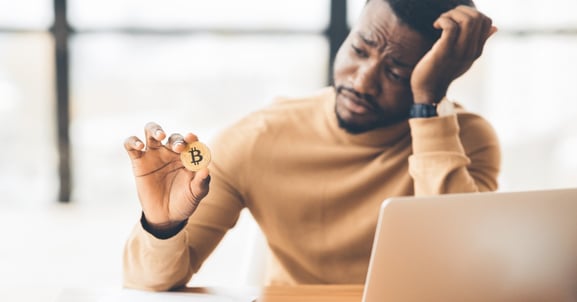
At some point during the pandemic, I needed to step away from listening to the news and focus my brain on something complex, interesting and challenging – just to maintain my mental health. At that time, Bitcoin was back in the news. Someone asked me what Bitcoin was, and I realized I also didn’t know much about it. I figured since I am a financial advisor, I should at least know the basics. Little did I know that looking into Bitcoin would send me down a rabbit hole that would provide me the opportunity to dive into something complex, engaging, and challenging.
While I was learning, I bought some Bitcoin. Since then, people have asked me if they should buy it. It’s a difficult question to answer. Bitcoin and cryptocurrency, in general, are so new that we are unlikely to recommend people put it in their managed investment portfolios any time soon. (Plus, as things stand right now, it is challenging to get Bitcoin in a managed investment portfolio). Bitcoin is volatile, untested, and still complicated. Personally, I don’t like investing in anything I don’t fully understand. It will be a while until we are confident that our firm and our clients understand Bitcoin, its risks, and its long-term appeal to the point where we are putting it in portfolios.
But what if you want to buy Bitcoin yourself? Indeed, you could do that. Before you buy Bitcoin, here are five questions you might ask yourself.
1. Do you know what Bitcoin is?
You can google what Bitcoin is and find several different descriptions. There are countless articles on the internet designed to help you understand Bitcoin and other cryptocurrencies. To get a thorough understanding of it, I did a lot of research, including reading books and articles on the history of money, how our US currency works, and the beginnings of cryptographic money. As a result, I have a good understanding of Bitcoin and still struggle to articulate what it is in one sentence. So, falling back on Google here is one definition of Bitcoin:
According to Oxford Dictionaries, Bitcoin is a system of electronic money used to buy and sell online without a central bank.
Some common questions related to Bitcoin include:
- Can you describe how Bitcoin works?
- How many coins are there or will be?
- How is Bitcoin tracked and ownership proven on the blockchain?
- What are the pros and cons of a decentralized monetary system?
The answers to these questions are beyond the scope of this article. But researching and learning the answers to these questions would be an excellent first step in understanding Bitcoin and how it works.
2. Do you understand what affects the price of Bitcoin?
The price of Bitcoin can change by the minute. It trades all around the globe 24 hours a day, every day of the year. Sometimes I can see a direct reason for a price change, and other times I just scratch my head and wonder why.
One supposition is the price of Bitcoin should increase with inflation due to its limited supply- like how the price of real estate often rises when we see inflation. However, I’ve seen Bitcoin’s price increase with inflation, and I’ve seen the price not rise with inflation.
A rise in interest rates could cause the price of Bitcoin to go down. If interest rates rise, putting money into bonds becomes more attractive because they may offer a positive actual yield. A rise in interest rates can cause the price of assets that don’t earn anything – such as stock in startup companies and Bitcoin – to go down. I’ve seen that happen and not happen.
What else can cause a change in the price of Bitcoin? Apparently, a tweet by Elon Musk or other influential figures. A closing of Bitcoin mines in China. An announcement that El Salvador will treat Bitcoin as legal tender. A rumor that the SEC will allow an exchange-traded fund (ETF) that provides investors access to Bitcoin via futures contracts to form in the U.S. On any given day, a random word or event can send the price of Bitcoin up or down.
3. Have You determined the best way for you to secure Bitcoin?
Do you know the difference between the methods for storing your Bitcoin? The physical component of Bitcoin can be a complicated element of cryptocurrency.
A wallet is one form of storage. There are many types of wallets (and they are different from the kind in your back pocket), but the basic premise is that you hold your Bitcoin’s password or private key. But a private wallet with a private address has its issues. It’s estimated that 20% of bitcoin are lost. They get lost because people lose the passwords to their private keys. For example, in the UK, a man lost 7500 bitcoin because the password to his wallet was on a computer that went to a garbage dump. As I write this, that loss is worth over $450 million.
An alternative to a private wallet is to hold Bitcoin on an exchange. Exchanges are becoming popular, but some bitcoin enthusiasts use the mantra: “Not your keys, not your crypto.” The meaning behind this saying dates back to the most extensive hack to a Bitcoin exchange in 2014. Mt Gox lost approximately 740,000 bitcoin, and the exchange was bankrupt by the end of that year.
Another security problem can occur if you send your Bitcoin to someone and use the wrong address. There are no rules that will require the incorrect recipient to send it back to you. Your Bitcoin would be gone.
4. Can you handle Bitcoin’s volatility?
And by volatility, I mean the rollercoaster ride Bitcoin takes you on. Prices can change 5% in a day or 5% in an hour. According to the Motley Fool, between 2013 and 2018, Bitcoin experienced more than 20 corrections where the price fell by more than 22%. Plus, in 2013, Bitcoin dropped more than 70%. I don’t have to google to know that Bitcoin is far more volatile than the stock market. So, you may want to ask yourself how you will feel if Bitcoin goes down 10% in a day. Or 70% within a few months.
5. Can you afford to lose it all?
In 2017 a UK regulator warned you should not buy Bitcoin unless you were prepared to lose it all. Treasury Secretary Janet Yellen recently warned about Bitcoin: “It is a highly speculative asset, and you know I think people should be aware it can be extremely volatile, and I do worry about the potential losses that investors can suffer.” China has effectively banned Bitcoin. Regulations are sure to come in the U.S. While regulations are being sorted out, there is also an outside chance Bitcoin could be regulated to the point where it is unusable. Then there is also the risk of theft by hackers.
I still strongly feel that I don’t want to invest in something I don’t understand, which makes sense for most people. Before buying Bitcoin, I strongly encourage you to research to learn what it is, how it works, what the rollercoaster ride is likely to be, and determine how you want to hold and secure it. While it could be that Bitcoin ends up being a widely accepted asset class and normal to hold in portfolios in the future, we aren’t there yet. If you decide to invest in Bitcoin, be sure it is an amount you can afford to lose.




